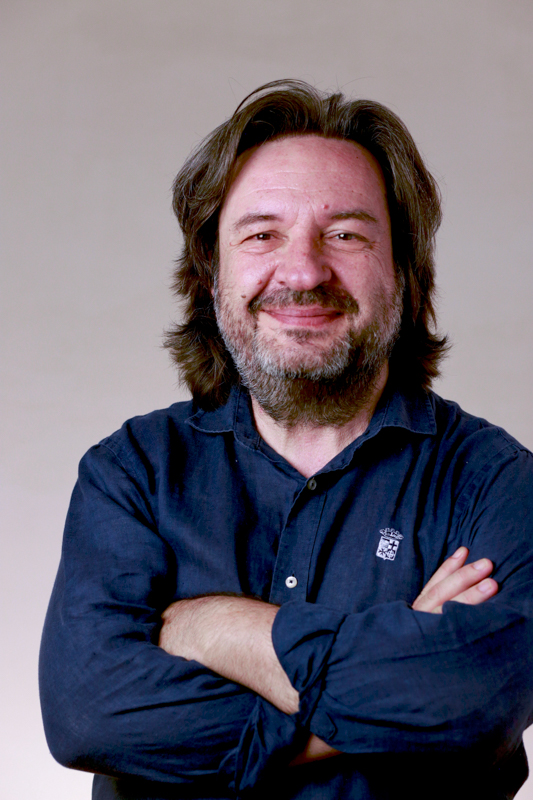Paolo Baragli graduated in Veterinary Medicine at the University of Pisa in 1994 and received his PhD in Equine Physiology in 1998. He practiced the profession within the equine veterinary medicine since 1995. He’s dedicated to full-time scientific research since 2007. Since 2010 he is a researcher in the Department of Veterinary Sciences, University of Pisa. Initially, the research of Paolo Baragli focused on understanding the mechanisms that regulate the neuroendocrine/physiological response to the exercise in horses. He developed an animal model on the treadmill to study the exercise-induced changes of the kinetics of plasma catecholamines in horses. Subsequently, his research focused on the study of the behavior and psychology of the horse, even when the horse interacts with human beings, with particular interest in the connections between the autonomic nervous system, behavior and cognitive skills. From 2013 Paolo Baragli collaborates with the Center of Bioengineering and Robotics of the University of Pisa for the application of bioengineering techniques to the study of emotional behavior of the horse in the routine management and interaction with human beings. The research activity is targeted to the potential practical applications of the results, to improve the welfare and psycho-physical state of horses and therefore their athletic ability. Paolo Baragli is member of the International Society for Equitation Science. He publishes regularly in international scientific journals and is a speaker at conferences. In 2013 he has been invited speaker at the International Ethological Conference (Newcastle, UK) and is a professor of Ethology and Management of the Horse at University Master Degree in Equestrian Rehabilitation (University of Florence, from 2013).
Relevant papers
Scopa, C., Palagi, E., Sighieri, C., & Baragli, P. (2018). Physiological outcomes of calming behaviors support the resilience hypothesis in horses. Scientific Reports, 8(1), 17501.
Alterisio, A., Baragli, P., Aria, M., D'Aniello, B., & Scandurra, A. (2018). Could the Visual Differential Attention Be a Referential Gesture? A Study on Horses (Equus caballus) on the Impossible Task Paradigm. Animals, 8(7).
Baragli, P., Vitale, V., Sighieri, C., Lanata, A., Palagi, E., & Reddon, A. R. (2017). Consistency and flexibility in solving spatial tasks: different horses show different cognitive styles. Scientific Reports, 7(1), 16557.
Baragli P, Demuru E, Scopa C, Palagi E (2017) Are horses capable of mirror self-recognition? A pilot study. PLoS ONE 12(5): e0176717. https://doi.org/10.1371/journal.pone.0176717
Bonelli, F., Sgorbini, M., Meucci, V., Sighieri, C., & Baragli, P. (2017). How swimming affects plasma insulin and glucose concentration in thoroughbreds: A pilot study. The Veterinary Journal, 226, 1-3. http://dx.doi.org/10.1016/j.tvjl.2017.06.006
Guidi, A., Lanata, A., Valenza, G., Scilingo, E. P., & Baragli, P. (2017). Validation of smart textile electrodes for electrocardiogram monitoring in free-moving horses. Journal of Veterinary Behavior, 17, 19-23. https://doi.org/10.1016/j.jveb.2016.10.001
Guidi, A., Lanata, A., Baragli, P., Valenza, G., & Scilingo, E. P. (2016). A Wearable System for the Evaluation of the Human-Horse Interaction: A Preliminary Study. Electronics, 5(4), 63. doi:10.3390/electronics5040063
Lanata, A., Guidi, A., Valenza, G., Baragli, P., & Scilingo, E. P. (2016). Quantitative heartbeat coupling measures in human-horse interaction. In Engineering in Medicine and Biology Society (EMBC), 38th Annual International Conference of the (pp. 2696-2699). doi:10.1109/EMBC.2016.7591286
Lanata A, Guidi A, Baragli P, Valenza G, Scilingo EP (2015) A Novel Algorithm for Movement Artifact Removal in ECG Signals Acquired from Wearable Systems Applied to Horses. PLoS ONE 10(10):e0140783. doi:10.1371/journal.pone.0140783
Paolo Baragli, Barbara Padalino, Angelo Telatin (2015) The role of associative and non-associative learning in the training o

